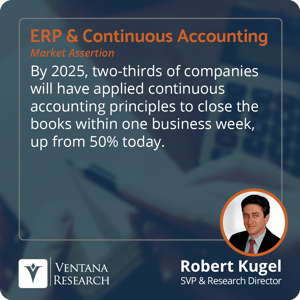I recently attended an analyst conference held by Unit4, an enterprise resource planning vendor focused on midsize organizations in people-centric industries. The conference was intended to communicate the company’s strategy, product updates and roadmap. The meeting took place shortly after announcement of the availability of Unit4 Industry Mesh and the acquisition of Compright, which does compensation planning as well as in the context of the broad technology shifts affecting ERP applications.
 Earlier I wrote about the technology forces that are fundamentally changing ERP systems and how organizations use them. The technology evolution driving that change began more than a decade ago in bits and pieces but is coalescing in a substantial rethinking of how people work with the software, which in turn will change how organizations can operate for the better. For example, technology has enabled companies to more readily adopt a continuous accounting approach, which streamlines accounting processes, reduces staff workloads and can accelerate an organization’s accounting close. By 2025, Ventana Research asserts that two-thirds of companies will have applied continuous accounting principles to close the books within one business week, up from 50% today.
Earlier I wrote about the technology forces that are fundamentally changing ERP systems and how organizations use them. The technology evolution driving that change began more than a decade ago in bits and pieces but is coalescing in a substantial rethinking of how people work with the software, which in turn will change how organizations can operate for the better. For example, technology has enabled companies to more readily adopt a continuous accounting approach, which streamlines accounting processes, reduces staff workloads and can accelerate an organization’s accounting close. By 2025, Ventana Research asserts that two-thirds of companies will have applied continuous accounting principles to close the books within one business week, up from 50% today.
Vendors have recently undertaken architectural shifts that represent the culmination of a multitude of incremental steps to improve the user experience, reduce operational frictions and increase the analytical capabilities built into ERP systems. And because of the evolution of data architecture, newer ERP systems can present a broader set of information related to a process or a decision point — even data from multiple systems of record. Some of the more recent changes have been the result of a steady migration to the cloud, since these systems are typically updated frequently, require less maintenance, have better performance and are more readily available than those operating on-premises.
Deploying software in the cloud has been a boon for midsize businesses, eliminating the need for workers to maintain software while spreading the cost of compute and storage to provide better performance at an affordable price. With a web-based application, vendors have greater control over the system’s operating environment, so it is easier to innovate and improve, especially in usability and user experience. There are a wide range of potential services that, for example, simplify business-to-business transactions and provide value-added business services. These, too, are more likely to benefit midsize businesses that have fewer resources than larger organizations yet have almost the same requirements.
The just-announced Industry Mesh is an example of how the cloud enables a vendor to make its software more valuable to customers. It is a service available as part of Unit4’s ERPx cloud platform, designed to provide industry-specific ERP and packaged integrations for midsize organizations. The objective is to facilitate process and data connections between sets of applications typically used by organizations in specific industries that provide complementary functionality — for example, a customer relationship management system, treasury and tax software and collaboration applications, among others. Industry Mesh is designed to make a richer set of data available to improve performance while cutting the cost of establishing and maintaining cross-application integrations.
Compright offers software designed to make the compensation process more effective by determining competitive pay and total rewards in specific industries and locations. The organization has customers in over 40 countries. Compensation management is especially important for Unit4’s targeted industries, all of which are people-intensive because of their need to attract and retain talent and because headcount accounts for a large percentage of total expenses.
The purchase of Compright is also consistent with the strategy of TA Associates, one of the oldest private equity firms in the U.S., which acquired Unit4 from Advent, another PE company, for a bit more than $2 billion in March 2021. The acquisition seeks to capitalize on the technology trends in ERP and generate significant revenue growth through:
- Increasing the annual average recurring revenue from each customer by expanding the breadth of Unit4’s applications and services.
- Creating a much larger presence in the North American market. Currently, its customer base is mainly in the U.K. and Europe.
- Increasing market share by focusing on industry-specific markets and providing organizations with a superior product, service and user experience.
Unit4 management gave professional services organizations as an example of where it would be investing resources. The business model for these organizations — including management and IT consulting, business services, and architecture, engineering and construction — dictates specific needs. Unit4’s addressable market is comprised primarily of relatively flat organizations with 40 to 250 billing professionals, which require as small an administrative staff as possible, since overhead either eats away at the budget for support personnel who deliver value to customers or diminishes profitability.
Professional services organizations’ stock-in-trade are mostly projects, and staffing them with the most appropriate people becomes a major challenge when organizations grow beyond a couple dozen billing consultants. Software can help in this regard. Managing projects well requires a software architecture that simplifies management, accounting, analysis and reporting. There are already multiple offerings on the market aimed at this vertical, but there is scope to provide software that improves operations, reduces administrative workloads and provides greater forward-looking clarity to guide executives.
At the same time, the ERP market aimed at midsize organizations is fiercely competitive. There are multiple vendors eying every vertical submarket as an opportunity to take advantage of recent technology trends to provide customers with the same benefits Unit4 plans to offer. This is especially true in North America, a market where Unit4 has limited brand recognition. In this regard, the access to capital for organic growth and complementary acquisitions pro vided by the change in ownership will be helpful.
 Technology is changing ERP systems, and with it, buyers’ expectations. Unit4 is in the process of taking advantage of this market shift to expand its portfolio of applications aimed at its core vertical markets, broaden the functionality and services it offers customers and increase its presence in the important North American market. The validation for Unit4 is also through its customers that gain value from their products, and that we identified in Migros Aare with Unit4 receiving the 14th Annual Overall Leadership Award in 2021. I recommend that organizations that are in the company’s core verticals – professional services, higher education, non-profits and government – and are looking for a new ERP system investigate Unit4 for this purpose.
Technology is changing ERP systems, and with it, buyers’ expectations. Unit4 is in the process of taking advantage of this market shift to expand its portfolio of applications aimed at its core vertical markets, broaden the functionality and services it offers customers and increase its presence in the important North American market. The validation for Unit4 is also through its customers that gain value from their products, and that we identified in Migros Aare with Unit4 receiving the 14th Annual Overall Leadership Award in 2021. I recommend that organizations that are in the company’s core verticals – professional services, higher education, non-profits and government – and are looking for a new ERP system investigate Unit4 for this purpose.
Regards,
Robert Kugel


 Earlier I wrote about the technology forces that are
Earlier I wrote about the technology forces that are  Technology is changing ERP systems, and with it, buyers’ expectations. Unit4 is in the process of taking advantage of this market shift to expand its portfolio of applications aimed at its core vertical markets, broaden the functionality and services it offers customers and increase its presence in the important North American market. The validation for Unit4 is also through its customers that gain value from their products, and that
Technology is changing ERP systems, and with it, buyers’ expectations. Unit4 is in the process of taking advantage of this market shift to expand its portfolio of applications aimed at its core vertical markets, broaden the functionality and services it offers customers and increase its presence in the important North American market. The validation for Unit4 is also through its customers that gain value from their products, and that 








